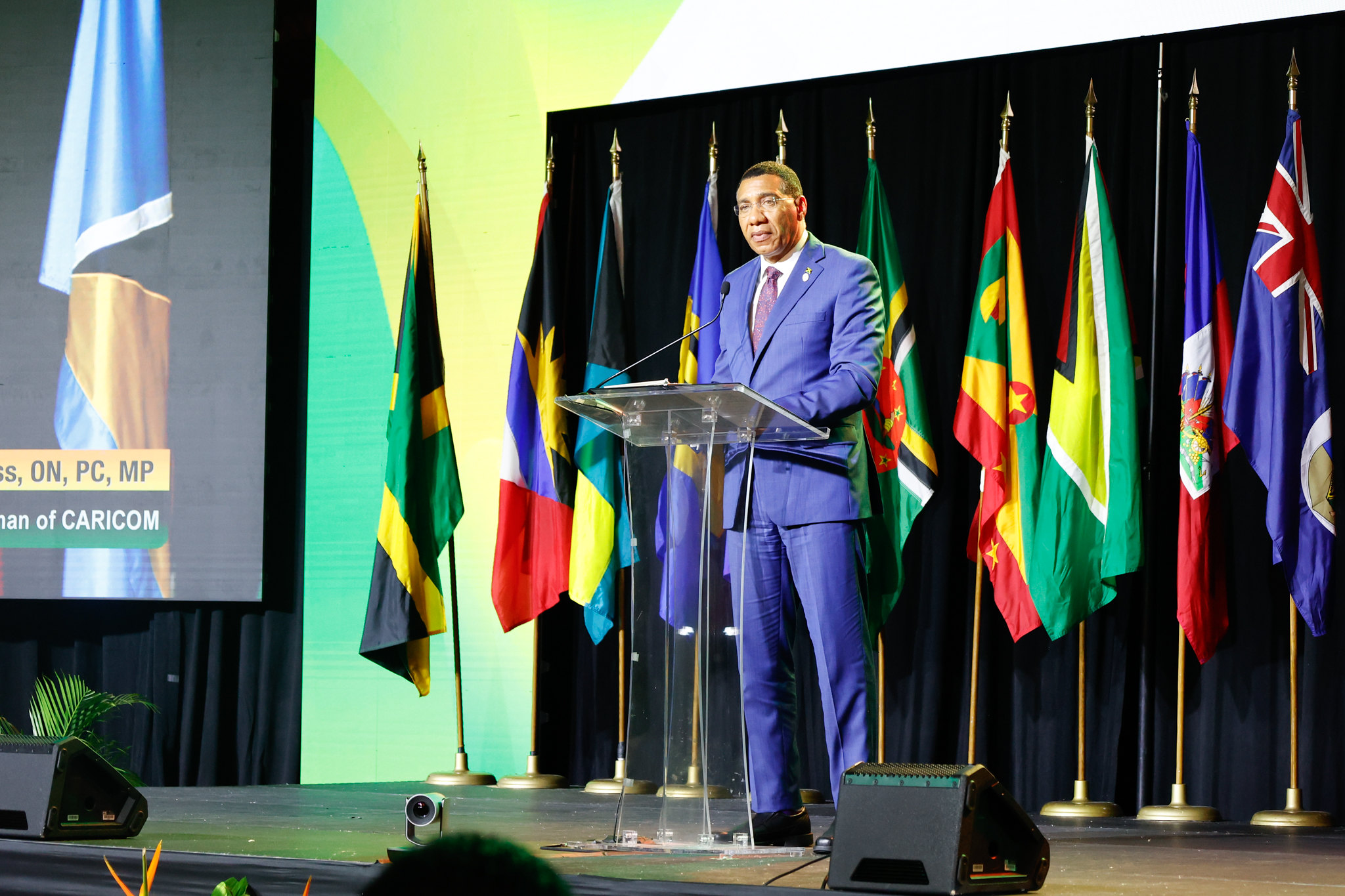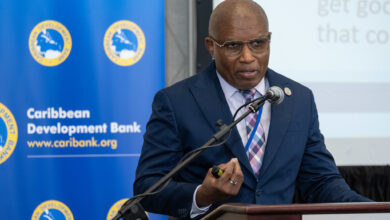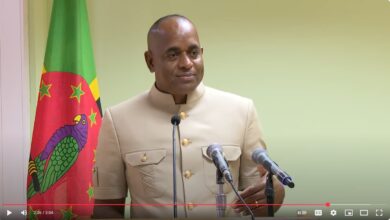Thank you, colleagues.
Let me acknowledge Senator Janice Allen, representing the Leader of the Opposition,
Dr. Carla Barnett, CARICOM Secretary-General,
Chief Ministers and Ministers of Government,
Members of the Judiciary,
The newly installed president of the Caribbean Court of Justice, the Honourable Mr. Justice Winston Anderson,
Members of the Diplomatic Corps,
Representatives of regional and international organizations,
Distinguished delegates,
Specially invited guests,
Members of the media,
Ladies and gentlemen, welcome to Jamaica!
We are delighted that you have joined us on my assumption of the chairmanship of the Caribbean Community (CARICOM) for the remainder of 2025. I thank my colleague and friend, the Honourable Mia Mottley, Prime Minister of Barbados, for ably steering us through the first six months of the year, and she has done so with the fervor, determination, and eloquence for which she is well known and admired.
I want to thank you, Mia, because we started out at the same time. I was a bit worried when you said, ‘young and romantic then,’ and you caught up to say, ‘still young and romantic now,’ so we are still in the same category, but I also thought that you would’ve used another one of Jimmy Cliff’s great songs. Yes, we all can see clearly after the event, after the challenge, and after we have exercised our duties. We all should be aspirational, and we all should hope for the best, and we all should persevere.
Yes, we can get it if we really want it, but upon assuming this role, I’m also cognizant, Mia, as your presentation would’ve alerted us to, there are still many rivers to cross. So, my job will be to get us across those rivers safely and get across as many of them as possible. And don’t worry, you are in safe hands.
I am especially pleased that so many of my colleagues are here in Montego Bay, some of whom were with me in 2018. I’m looking at one of my political fathers, Ralph Gonsalves, but allow me to take time to congratulate my friend, the Honourable John Briceño, Prime Minister of Belize, whose government was reelected in March.
Though her delegation is not here, I must congratulate the Honourable Kamla Persad-Bissessar, newly elected Prime Minister of Trinidad and Tobago. We also acknowledge the return to office of the Honourable David Burt as Premier of Bermuda and the Honourable Charles Washington Misick as Premier of the Turks and Caicos Islands. In her absence, we acknowledge the election of the Honourable Cora Richardson-Hodge, Premier of Anguilla, who is the first woman to serve in this distinguished capacity.
We have some special guests with us, His Excellency Valdecy Urquiza, Secretary-General of the International Criminal Police Organization, INTERPOL, and we look forward to the fruitful exchanges that we will have with him to further enrich our partnerships at all levels.
I’m also pleased to welcome our special guest, His Excellency Albert Ramdin, a son of CARICOM, and the first from our region to serve as Secretary-General of the Organization of American States, the OAS.
I also wish to acknowledge and once more welcome Dr. Carla Barnett, Secretary-General of CARICOM, and her team, with whom I’ll be working even more closely since assuming the chair of the Community. Thank you, Secretary-General, and your team, for your usual support.
Excellencies,
Ladies and gentlemen,
Our theme, “People, Partnership, Prosperity: Promoting a Secure and Sustainable Future,“ captures the essence of our regional purpose. It reflects a profound truth that security and resilience are not optional. They are foundations for prosperity. People-centred development and strategic partnerships are not merely aspirational; they are essential.
As small states, we are vulnerable not just to global economic shocks and natural hazards, but to being marginalized in a world where power and influence often outweigh genuine need. And that is why we must think strategically, act collaboratively, and remain focused on the values and interests that unite us.
Prime Minister Mottley expressed, as I’ve said quite eloquently, many of the threats that we face, which, as small countries, we grapple with. Oftentimes as leaders, as we contemplate these challenges and we look at our size relative to the rest of the world, it can be daunting. Sometimes we may have the expectation that exceptions will be made for us and that our case will be treated with deference and deferential favour. But I think that as we enter into the new order that seems to be emerging in the world, we must be strategic. We must strengthen our institutions. We must take responsibility for our own destiny because that is the only way we’re going to really get it if we really want it.
It means we must focus on people because human development must be the center of the integration mission. It must be the center of the development mission, ensuring food security, access to decent work, climate protection, and, importantly, opportunities for our youth, who make up 60% of our population. We must focus on people.
We must also focus on partnerships because global progress is built on networks of trust. We need stronger ties within CARICOM and with strategic global partners in Africa, North and South America, Europe, Asia, the Pacific, and the Middle East. In the new dispensation, which is emerging, it is clear that the world is not unipolar and that there are opportunities that we must explore. There are gains that we have left on the table unexplored, and as a Community, we must strengthen South-South cooperation. We must strengthen our trade cooperation with Africa, and we must strengthen our internal cooperation. The resources in CARICOM are sufficient for us to provide for the needs of our people. Guyana with energy and land, Suriname with energy and land, Trinidad, and Jamaica with incredible human resources.
What has stopped us for these many years? We have been saying we really want to get it. Did we really want it?
I think that the emerging global situation must now push us to really get it. We can get it because the time to get prosperity for our people is now. But that prosperity must be inclusive. It can’t be for some; it must be for everyone in this region, including our brothers and sisters in Haiti. It must be sustainable, and it must be resilient.
Sustainability and resilience are the two new buzzwords now that every government must focus on, and so it is that the policies that we will pursue in CARICOM, whatever they are, whether they are the institutional structures that we will have to reexamine, the trade policies that we will have to pursue, or the security policies that we will have to pursue, they must be pursued through the lens of sustainability and resilience.
Jamaica will continue to champion initiatives that will make these three pillars—People, Partnerships and Prosperity—not just aspirational, because we have seen leaders come before with these aspirations. We have seen the words expressed before. The problem has always been our ability to be bold enough, strategic enough, systematic enough, and disciplined enough to convert these dreams and aspirations and these words into reality.
The presence of delegations from 48 countries today is a powerful statement of global confidence in CARICOM and in our shared agenda. We are meeting at a time of intense international activity. In the months ahead, CARICOM will engage the world through the second CARICOM-Africa Summit in Ethiopia and during the 80th anniversary of the United Nations.
As small, vulnerable states, the unavoidable reality of the climate crisis stands as a sobering reminder each year, especially during the annual hurricane season. And as we prepare for COP30 in Belém, Brazil, our call is urgent and clear. The promises of the Paris Agreement must be met both in emissions reductions and access to climate finance at the level and scale required. Our discussions tomorrow will give special attention to COP 30 preparations and climate finance, which remain defining issues for our region’s survival and prosperity.
For others, the issue of climate change may be an academic discussion between scientists trying to determine whether the data set is accurate or whether historically climate has changed over time, and therefore, climate change now is nothing new; it is an academic discourse. But last year, just around this time, Jamaica was staring down the earliest-forming and probably the quickest-forming Category 4 hurricane, which devastated a third of our island. So, for us, climate change is not an academic discussion. Climate change is real.
We live it almost every day, and the impact of this must be understood from the fiscal level and the need for financing, but certainly because of our size. A weather event in Texas, and our sympathies and condolences go out to the people of the United States, particularly the people of Texas, who were impacted by the recent weather events, which resulted in flooding. But the impact of this will have no effect on the overall fiscal situation of the United States. A similar weather event in any of our economies would have a devastating effect, and therefore, we must continue to strongly advocate for climate justice and climate financing. You have my assurance that Jamaica will continue to be a strong advocate for climate justice and climate finance.
Friends, there can be no sustained prosperity without security. A July 2024 report by the United Nations Office on Drugs and Crime entitled “Caribbean Gangs: Drugs, Firearms, and Gang Networks in Jamaica, St. Lucia, Guyana, and Trinidad and Tobago” points to a worrying combination of risk factors, including surging drug production in South America, the proliferation and competition of transnational and local gangs, and the high availability and use of firearms that have contributed to soaring homicide rates. If the situation in Haiti is an indicator, these are not ordinary times, and they require urgent action. We must dismantle the influence of gangs in our communities, disrupt their financing, and cut off access to weapons.
I am on record as saying that we need to launch a war on gangs of a similar magnitude and nature to the war on terror. Aside from the climate threat, the threat that is most likely to have an existential threat in the near term for many of our states would be the growth of gangs. Many Caribbean states, by virtue of our history and the kind of civilization that we wish to develop, would seem to categorize gangs as a social problem, a problem caused by alienation of youth, poverty, and breakdown in social mores and values, and therefore the policy response should be a social response, one that treats crime and violence as a public health crisis, and this is so. There is no question that it is a social problem why 90% of persons involved in crime are males, and speaking for Jamaica, 90% of victims of homicides are males. So yes, there is that strong social component. But I believe our society and the way in which we think about crime and violence need to evolve to accept and understand the evolved nature of the challenge we face.
And the truth is that what we are now facing is the organization of violence. It is the organization of violence for profit. It is not merely street-level dispossessed or socially excluded youngsters. There is a level of intelligence, a level of resources, and a level of organization that has been brought to crime, and violence is being used to support a profit motive. And my own view is that policy and jurisprudence need to evolve to address this matter. As I said, the situation in Haiti is only an example that we should look at very carefully.
The Jamaica Constabulary Force (JCF) Expo, which you can view just outside this room in a couple of minutes from now, is intended to spotlight our shared commitment to building a safer, more resilient region by exchanging ideas, innovations, and best practices. It is also an opportunity for you to see how the significant investments made by the Government of Jamaica in national security over the past nine years are yielding results in crime reduction and public safety.
I just want to say here that the scale and magnitude of the problem (crime), which is being faced by almost all member countries of CARICOM, cannot be addressed overnight. It took 40 years for the problem to emerge to where it is, and it will not be solved by short-term measures. It will require significant investment, but it will also require unified public support. As we observe the challenges in several of our member states and we see the rising homicide rates, we also see political dissonance, and so it is absolutely important that we come together as a region so that our individual publics can see and appreciate that they are not alone in this problem, that the gangs in Jamaica likely have a connection with gangs in St. Lucia, in Trinidad, in Haiti, or in the Bahamas, and that there needs to be joint, coordinated action from the regional level. And I believe, from what I have seen and experienced in working with my colleagues, that there is a strong appetite for regional cooperation to treat the security matters that are affecting our individual countries. And as chairman, you have my assurance that the matter of security, regionally and in terms of individual countries, will be a matter of great priority under my chairmanship.
The 49th Regular Meeting will also provide another critical platform for dialogue on the situation in Haiti. We remain committed to advancing solutions that promote peace, stability, and development for our sister nation and, by extension, the wider Community. Jamaica was one of the first countries to give a commitment that we would support Haiti with security personnel and to raise the call for support for Haiti. As Mia had pointed out, the appetite to support Haiti seemed to have been lost. The international momentum in support of Haiti seemed to have slowed. We cannot be true to our principles in CARICOM if we do not redouble our efforts in the international community to garner support for the mission in Haiti. We cannot leave our brothers and sisters in Haiti at the mercy of gangs. Haiti and the mobilization of international support for the security efforts in Haiti will be another area of significant effort and priority for CARICOM under my chairmanship.
Excellencies, ladies and gentlemen, while not on the agenda, it is important that we take note of the outcome of last week’s Fourth International Conference on Financing for Development (FfD4), as stated in the Sevilla Commitment. Chief among these are the actions needed to close the $4 trillion SDG financing gap and advance a multilateral ecosystem that is more inclusive, representative, equitable, and effective.
Importantly, the conference secured reaffirmation of the special circumstances of Small Island Developing States and the ABAS agenda. Jamaica will continue to use our co-chairmanship of the UN Secretary-General’s SDGs Stimulus Group and the Group of Friends of SDG Financing at the UN for advocacy to ensure that the commitments made are not mere words on paper but translate into tangible outcomes for the benefit of future generations of the citizens of CARICOM.
Excellencies, ladies and gentlemen, since its inception, the CARICOM Single Market and Economy (CSME) has been acknowledged as holding seeds of great potential, yet many aspects of operationalization continue to elude us, including that of free movement. As the world presses us to strengthen our collective self-sufficiency, we can feel encouraged that 2025 has already marked a turning point with the completion of the signature by participating member states of the Protocol of Enhanced Cooperation. This development represents a timely and valuable opportunity to accelerate the efforts of countries. I look forward to our discussions in this context.
Jamaica recently became the eighth country to have participated in national consultations on the implementation of CSME initiatives with the active support of the CARICOM Secretariat. These broad-based engagements across the region are designed to deepen stakeholder understanding of the CSME and to showcase the concrete benefits it offers. They represent an important step towards building broader public support and strengthening confidence in the integration process. We commend the secretariat on its selection and appointment of CSME youth ambassadors who will also be engaged in this process.
As CARICOM leads external trade negotiations, I will continue to work with my colleagues to facilitate reasonable and balanced recommendations on how we can best navigate certain dynamics, ensure that our voices are heard in all relevant fora, and ensure that our perspectives advance the objectives of a free, transparent, rules-based, inclusive, and equitable multilateral trading system. Our heads subcommittee for this area convenes again this week, and we’ll report back to the plenary.
Excellencies, ladies and gentlemen, this conference will address a wide range of human and social development issues, telecommunications, transport, industrial growth, and demographic shifts. Alongside these functional priorities, it is clear that key institutional aspects of our regional movement now require renewed focus as we strive to strengthen both internal coordination and external partnerships.
Allow me to say a few words about youth engagement because I am resolute in my belief that young people must have a voice in shaping the decisions that affect their future. Youth across the region have thoughts and ideas about what we are trying to put in place for them and future generations. As key drivers and consumers of technological advancement, they hold immense potential to contribute meaningfully to our development goals. It is important that we engage them in a deliberate, sustained, and meaningful way. Let this meeting send a clear signal that we believe in our youth, we include them in the decision-making process for their future, and their inclusion is not just symbolic but real.
And as we’re talking about youth, who are oftentimes the main consumers of technology, social media, and artificial intelligence, I’m very happy that Mia has raised this issue publicly, as we have internally and within our own countries and Cabinets discussed the impact of how our culture, the essence of who we are, is being changed in dramatic ways that are having a significant negative impact on our societies. This is not a call to regulate, to restrict, or to censor, but I believe that if we are not careful, the Caribbean civilization, quoting Mia’s characterization of who we are and what we’re trying to build, could easily evaporate. And so, as we talk about our youth, we must include them in a discussion about how we preserve our culture, our values, our mores, and how we preserve the Caribbean people.
Excellencies, ladies and gentlemen, it would be difficult to speak about our priorities as a region without acknowledging the broader global context in which we operate. From the humanitarian crisis in Gaza to the escalating tensions in the Middle East, to the prolonged war in Ukraine, and underreported conflicts in Africa, each speaks to a more divided and fragile world. These realities affect us through energy prices, food insecurity, migration, and more. In this moment, we must be resolute in preserving CARICOM as a zone of peace and reaffirm our commitments to working with the international community to promote de-escalation, uphold diplomacy, and pursue lasting solutions grounded in dialogue and mutual respect. We have a lot of ground to cover over the next few days. Hopefully, we’ll cross some of the rivers that I have outlined, but certainly we will prepare the next generation to be able to cross those rivers. We will get it because we really want it.
So, as I conclude, I draw inspiration from the words of The Right Excellent Marcus Mosiah Garvey, Jamaica’s first national hero, who urged us to take advantage of every opportunity and, where there is none, make it ourselves.
And in the spirit of possibility, we are reminded by the great Sir Derek Walcott that there is always more to see. Let us therefore move forward with clarity, with a sense of optimism that yes, we can get it, but also with a deep sense of purpose and understanding of what the realities we face are, with no expectations of favours from the world. We are independent, we are strong, and we have what it takes to fulfil the CARICOM dream of prosperity for all our people. Let us reignite and reaffirm our unity as one Caribbean people with purpose and pride. We will get it because we really want it, and it’s now clearer for us to cross all the rivers that are there.
God bless you and thank you.






